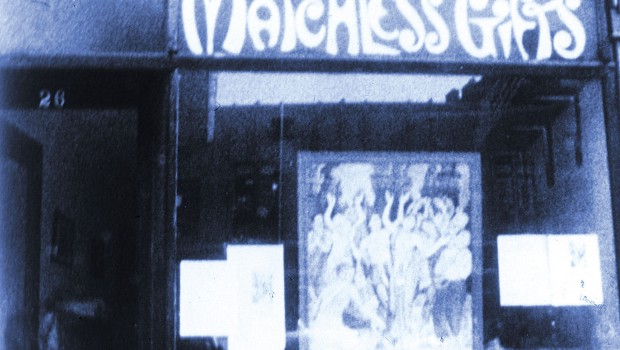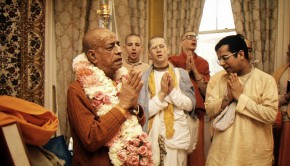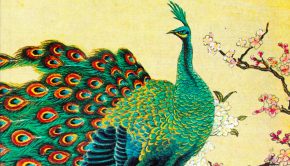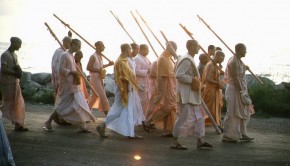Letter to Hayagriva dasa on Meeting Srila Prabhupada
As you are remembering our old meeting days on the second avenue, when I first started my lectures there, similarly I also remember the incidents and speak to so many friends and disciples. So our meeting was Krishna’s desire. Apparently it was accidental but actually it was Krishna’s plan.
Los Angeles 18 November, 1968
My Dear Hayagriva,
Please accept my blessings. I beg to acknowledge receipt of your letter of Nov. 12, 1968, and I am very much pleased to note the contents. The handbill of Dr. Frog, Ph.D. is very funny, and we should try to fight with these frog philosophers overcrowding all over the world. Your success in kirtana performances in the University campus is also very encouraging.
New Vrindaban should be taken up very seriously because actually I want to develop a replica of Old Vrindaban. I have got ambition to construct there 7 temples as follows: 1. Radha Madan Mohan, 2. Radha Govinda, 3. Radha Gopinatha, 4. Radha Damodara, 5. Radha Raman, 6. Radha Gokulananda, 7. Radha Syamasundara.. The whole modern city of Vrindaban was established originally with these temples, started by different Gosvamis. And later on, many kings and princes started their own temples and thus the present Vrindaban is now full with small and big 5000 temples.
We have to make such scheme in our New Vrindaban, gradually expanding to an area of one mile long and one mile broad. Vamanadeva is still here, and I have advised him to construct some thrones for Radha and Krishna, because Nara Narayana is attempting to get some pairs of Radha Krishna Murtis 24″ high. We shall require so many pairs of Radha Krishna Murtis at different temples. Anyway, do not feel discouraged. As soon as New Vrindaban is connected with a link road as well as electricity, very soon it will develop into our idea. I shall personally go and stay there and see it is developed.
Regarding Srimad-Bhagavatam, please send me the chapters which you have already revised. I want to see it, how it is being done. I am glad that you are not omitting anything, but just making grammatical correction, and phrasing for force and clarity, and adding Pradyumna’s transliteration, that is very nice.
Yes, henceforward, as I have already told you, that Srimad-Bhagavatam will be ultimately seen by you, before being printed. That will keep consistency, I quite agree with you. My present plan is to stay in Los Angeles, perhaps at least for more than a month, which will cover Christmas holidays. And so, during that time, if you come here, it will be very nice. In January I may go to Hawaii, if Gaurasundara takes me there. As you have given up the idea of marriage, I think you can give up the idea of seeing your parents annually. You just prepare yourself for further advanced spiritual life. After all, our mundane relationships with father and mother, or wife and children, cannot protect us from the trap of maya. It is said by one Vaisnava poet that in every form of life, one gets a father and mother, because without father and mother, nobody is able to get a material body. So father and mother is possible in any form of body, but only in this human form of body one can get in touch with Krishna and a bona fide Spiritual Master. That is the highest gain of our travelling in different species of life in different planets.
I am so pleased that you are feeling for me and listening to my old tapes with pleasure. As you are remembering our old meeting days on the second avenue, when I first started my lectures there, similarly I also remember the incidents and speak to so many friends and disciples. So our meeting was Krishna’s desire. Apparently it was accidental but actually it was Krishna’s plan. So we should always remember this plan of Krishna and must continue to work jointly for advancement of Krishna Consciousness movement in this part of the world. I shall always pray to Krishna to give you more and more strength and confidence in this great responsibility and I shall pray for your long life to execute this mission.
Thank you once more for your nice sentiments, and I hope you are all well.
Your ever well-wisher,
A. C. Bhaktivedanta Swami
P.S. I would like to know whether if two young boys come there, if you can take charge of them as teacher for them.
They are very nice young Krishna Conscious boys, and their mother is very much in favor of them being trained up in our philosophy. They are between 10 and 12 years about. By teaching I mean teaching them The Teachings of Lord Caitanya, Bhagavad-gita, and Srimad-Bhagavatam, not preliminary education; preliminary education they already know. Please let me know about this.
ACB















The pastimes of the Lord in His childhood and youth:
Caitanya-caritamrta Adi. 16 26-111
On one full moon night the Lord was sitting on the bank of the Ganges with His many disciples and discussing literary topics. Coincidentally Keśava Kāśmīrī Paṇḍita also came there. While offering his prayers to mother Ganges, he met Caitanya Mahāprabhu. The Lord received him with adoration, but because Keśava Kāśmīrī was very proud, he talked to the Lord very inconsiderately. “I understand that You are a teacher of grammar,” he said, “and that Your name is Nimāi Paṇḍita. People speak very highly of Your teaching of beginners’ grammar. “I understand that You teach Kalāpa-vyākaraṇa. I have heard that Your students are very expert in the word jugglery of this grammar.” The Lord said, “Yes, I am known as a teacher of grammar, but factually I cannot impress My students with grammatical knowledge, nor can they understand Me very well.
“My dear sir, whereas you are a very learned scholar in all sorts of scriptures and are very experienced in composing poetry, I am only a boy-a new student and nothing more.”Therefore I desire to hear your skill in composing poetry. We could hear this if you would mercifully describe the glory of mother Ganges.” When the brāhmaṇa, Keśava Kāśmīrī, heard this, he became still more puffed up, and within one hour he composed one hundred verses describing mother Ganges. The Lord praised him, saying, “Sir, there is no greater poet than you in the entire world. “Your poetry is so difficult that no one can understand it but you and mother Sarasvatī, the goddess of learning. “But if you explain the meaning of one verse, we can all hear it from your own mouth and thus be very happy.”
The Digvijayī, Keśava Kāśmīrī, inquired which verse He wanted explained. The Lord then recited one of the one hundred verses Keśava Kāśmīrī had composed. ” ‘The greatness of mother Ganges always brilliantly exists. She is the most fortunate because she emanated from the lotus feet of Śrī Viṣṇu, the Personality of Godhead. She is the second goddess of fortune, and therefore she is always worshiped both by demigods and by humanity. Endowed with all wonderful qualities, she flourishes on the head of Lord Śiva.’ ” When Lord Caitanya Mahāprabhu asked him to explain the meaning of this verse, the champion, very much astonished, inquired from Him as follows. “I recited all the verses like the blowing wind. How could You completely learn by heart even one among those verses?” The Lord replied, “By the grace of the Lord someone may become a great poet, and similarly by His grace someone else may become a great śruti-dhara who can memorize anything immediately.” Satisfied by the statement of Lord Caitanya Mahāprabhu, the brāhmaṇa [Keśava Kāśmīrī] explained the quoted verse.
Then the Lord said, “Now kindly explain the special qualities and faults in the verse.” The brāhmaṇa replied, “There is not a tinge of fault in that verse. Rather, it has the good qualities of similes and alliteration.” The Lord said, “My dear sir, I may say something to you if you will not become angry. Can you explain the faults in this verse? “There is no doubt that your poetry is full of ingenuity, and certainly it has satisfied the Supreme Lord. Yet if we scrutinizingly consider it we can find both good qualities and faults.” The Lord concluded, “Now, therefore, let us carefully scrutinize this verse.” The poet replied, “Yes, the verse You have recited is perfectly correct. “You are an ordinary student of grammar. What do You know about literary embellishments? You cannot review this poetry because You do not know anything about it.”
Taking a humble position, Śrī Caitanya Mahāprabhu said, “Because I am not of your level, I have asked you to teach Me by explaining the faults and good qualities in your poetry. “Certainly I have not studied the art of literary embellishments. But I have heard about it from higher circles, and thus I can review this verse and find in it many faults and many good qualities.”
The poet said, “All right, let me see what qualities and faults You have found.” The Lord replied, “Let Me speak, and please hear Me without becoming angry. “My dear sir, in this verse there are five faults and five literary ornaments. I shall state them one after another. Kindly hear Me and then give your judgment. “In this verse the fault of avimṛṣṭa-vidheyāṁśa occurs twice, and the faults of viruddha-mati, bhagna-krama and punar-ātta occur once each. “The glorification of the Ganges [mahattvaṁ gaṅgāyāḥ] is the principal unknown subject matter in this verse, and the known subject matter is indicated by the word ‘idam,’ which has been placed after the unknown. “Because you have placed the known subject at the end and that which is unknown at the beginning, the composition is faulty, and the meaning of the words has become doubtful. ” ‘Without first mentioning what is known, one should not introduce the unknown, for that which has no solid basis can never be established anywhere.’
“In the word ‘dvitīya-śrīlakṣmī’ [‘the second all-opulent goddess of fortune’], the quality of being a second Lakṣmī is the unknown. In making this compound word, the meaning became secondary and the originally intended meaning was lost. “Because the word ‘dvitīya’ [‘second’] is the unknown, in its combination in this compound word the intended meaning of equality with Lakṣmī is lost. “Not only is there the fault avimṛṣṭa-vidheyāṁśa, but there is also another fault, which I shall point out to you. Kindly hear Me with great attention. “Here is another great fault. You have arranged the word ‘bhavānī-bhartṛ’ to your great satisfaction, but this betrays the fault of contradiction.
“The word ‘bhavānī’ means ‘the wife of Lord Śiva.’ But when we mention her husband, one might conclude that she has another husband. “It is contradictory to hear that Lord Śiva’s wife has another husband. The use of such words in literature creates the fault called viruddha-mati-kṛt. “If someone says, ‘Place this charity in the hand of the husband of the wife of the brāhmaṇa,’ when we hear these contradictory words we immediately understand that the brāhmaṇa’s wife has another husband. “The statement by the word ‘vibhavati’ [‘flourishes’] is complete. Qualifying it with the adjective ‘adbhuta-guṇā’ [‘wonderful qualities’] creates the fault of redundancy. “There is extraordinary alliteration in three lines of the verse, but in one line there is no such alliteration. This is the fault of deviation. “Although there are five literary ornaments decorating this verse, the entire verse has been spoiled by these five most faulty presentations. “If there are ten literary ornaments in a verse but even one faulty expression, the entire verse is nullified. “One’s beautiful body may be decorated with jewels, but one spot of white leprosy makes the entire body abominable. ” ‘As one’s body, although well-decorated with ornaments, is made unfortunate by even one spot of white leprosy, so an entire poem is made useless by a fault, despite alliteration, similes and metaphors.’ “Now hear the description of the five literary embellishments. There are two ornaments of sound and three ornaments of meaning. “There is a sound ornament of alliteration in three lines. And in the combination of the words ‘śrī’ and ‘lakṣmī’ there is the ornament of a tinge of redundancy.
“In the arrangement of the first line the letter ‘ta’ occurs five times, and the arrangement of the third line repeats the letter ‘ra’ five times. “In the fourth line the letter ‘bha’ occurs four times. This arrangement of alliteration is a pleasing ornamental use of sounds. “Although the words ‘śrī’ and ‘lakṣmī’ convey the same meaning and are therefore almost redundant, they are nevertheless not redundant. “Describing Lakṣmī as possessed of śrī [opulence] offers a difference in meaning with a tinge of repetition. This is the second ornamental use of words. “The use of the words ‘lakṣmīr iva’ [‘like Lakṣmī’] manifests the ornament of meaning called upamā [analogy]. There is also the further ornament of meaning called virodhābhāsa, or a contradictory indication. “Everyone knows that lotus flowers grow in the water of the Ganges. But to say that the Ganges takes birth from a lotus flower seems extremely contradictory.
“The existence of mother Ganges begins from the lotus feet of the Lord. Although this statement that water comes from a lotus flower is a contradiction, in connection with Lord Viṣṇu it is a great wonder. “In this birth of the Ganges by the inconceivable potency of the Lord, there is no contradiction although it appears contradictory. ” ‘Everyone knows that lotus flowers grow in the water but water never grows from a lotus. All such contradictions, however, are wonderfully possible in Kṛṣṇa: the great river Ganges has grown from His lotus feet.’ “The real glory of mother Ganges is that she has grown from the lotus feet of Lord Viṣṇu. Such a hypothesis is another ornament, called anumāna.
“I have simply discussed the five gross faults and five literary embellishments of this verse, but if we consider it in fine detail we will find unlimited faults. “You have achieved poetic imagination and ingenuity by the grace of your worshipable demigod. But poetry not well reviewed is certainly subject to criticism. “Poetic skill used with due consideration is very pure, and with metaphors and analogies it is dazzling.”
After hearing the explanation of Lord Caitanya Mahāprabhu, the champion poet was struck with wonder. His cleverness stunned, he could not say anything. He wanted to say something, but no reply could come from his mouth. He then began to consider this puzzle within his mind. “This mere boy has blocked my intelligence. I can therefore understand that mother Sarasvatī has become angry with me. “The wonderful explanation the boy has given could not have been possible for a human being. Therefore mother Sarasvatī must have spoken personally through His mouth.”
Thinking thus, the paṇḍita said, “My dear Nimāi Paṇḍita, please hear me. Hearing Your explanation, I am simply struck with wonder. “I am surprised. You are not a literary student and do not have long experience in studying the śāstras. How have You been able to explain all these critical points?”
Hearing this and understanding the paṇḍita’s heart, Śrī Caitanya Mahāprabhu replied in a humorous way. “My dear sir, I do not know what is good composition and what is bad. But whatever I have spoken must be understood to have been spoken by mother Sarasvatī.” When he heard this judgment from Lord Caitanya Mahāprabhu, the paṇḍita sorrowfully wondered why mother Sarasvatī wanted to defeat him through a small boy.
“I shall offer prayers and meditation to the goddess of learning,” the champion concluded, “and ask her why she has insulted me so greatly through this boy.” Sarasvatī had in fact induced the champion to compose his verse in an impure way. Furthermore, when it was discussed she covered his intelligence, and thus the Lord’s intelligence was triumphant. When the poetic champion was thus defeated, all the Lord’s disciples sitting there began to laugh loudly. But Lord Caitanya Mahāprabhu asked them not to do so, and He addressed the poet as follows. “You are the most learned scholar and the topmost of all great poets, for otherwise how could such fine poetry come from your mouth?
“Your poetic skill is like the constant flow of the waters of the Ganges. I find no one in the world who can compete with you. “Even in the poetic compositions of such great poets as Bhavabhūti, Jayadeva and Kālidāsa there are many examples of faults. “Such mistakes should be considered negligible. One should see only how such poets have displayed their poetic power.
“I am not even fit to be your disciple. Therefore kindly do not take seriously whatever childish impudence I have shown. “Please go back home, and tomorrow we may meet again so that I may hear discourses on the śāstras from your mouth.” In this way both the poet and Caitanya Mahāprabhu went back to their homes, and at night the poet worshiped mother Sarasvatī.
In a dream the goddess informed him of the Lord’s position, and the poetic champion could understand that Lord Caitanya Mahāprabhu is the Supreme Personality of Godhead Himself. The next morning the poet came to Lord Caitanya and surrendered unto His lotus feet. The Lord bestowed His mercy upon him and cut off all his bondage to material attachment. The poetic champion was certainly most fortunate. His life was successful by dint of his vast learning and erudite scholarship, and thus he attained the shelter of Lord Caitanya Mahāprabhu.
Śrīla Vṛndāvana dāsa Ṭhākura has described all these incidents elaborately. I have only presented the specific incidents he has not described. The nectarean drops of Śrī Caitanya Mahāprabhu’s pastimes can satisfy the senses of everyone who hears them. Praying at the lotus feet of Śrī Rūpa and Śrī Raghunātha, always desiring their mercy, I, Kṛṣṇadāsa, narrate Śrī Caitanya-caritāmṛta, following in their footsteps.
Dear god please grant me the strength & health to succeed in all my doing and all the work on my hands satisfy me with you kindness. i shall act wisely & have a successful life. please bless me with succeess in all my endeavours for i place my trust in you to send me good fortune.May you eternal kindness be upon me.